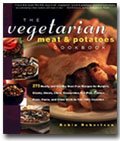A Paradoxical Meal

Why do Chinese Buddhist Vegetarian Restaurants serve imitation meat?
I understand, that Buddhist Vegetarians, due to their beliefs do not eat animal products because they don't want to cause suffering to other beings. But why indulge the carnivorous behaviour by serving imitation meat that taste almost like the real thing? It comes to me funny that most Chinese Buddhist Vegetarian restaurants out there are famous for their imitation dishes such as sweet and sour "pork", rather than their traditional pure vegetarian dishes. Surely, you can say that those "meat" dishes are catered for quasi-vegetarians, or Buddhists who usually eat meat on non-sacred days, but shouldn't the notion be kept especially when fasting on the sacred days?
Would you eat imitation human meat? They are made of tofu, and no human were killed during the making process, but oh yes, it tastes just like human. =P

Why do Chinese Buddhist Vegetarian Restaurants serve imitation meat?
I understand, that Buddhist Vegetarians, due to their beliefs do not eat animal products because they don't want to cause suffering to other beings. But why indulge the carnivorous behaviour by serving imitation meat that taste almost like the real thing? It comes to me funny that most Chinese Buddhist Vegetarian restaurants out there are famous for their imitation dishes such as sweet and sour "pork", rather than their traditional pure vegetarian dishes. Surely, you can say that those "meat" dishes are catered for quasi-vegetarians, or Buddhists who usually eat meat on non-sacred days, but shouldn't the notion be kept especially when fasting on the sacred days?
Would you eat imitation human meat? They are made of tofu, and no human were killed during the making process, but oh yes, it tastes just like human. =P
